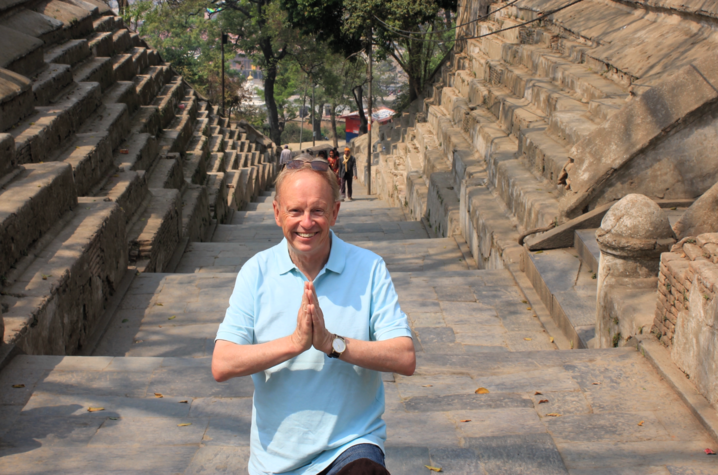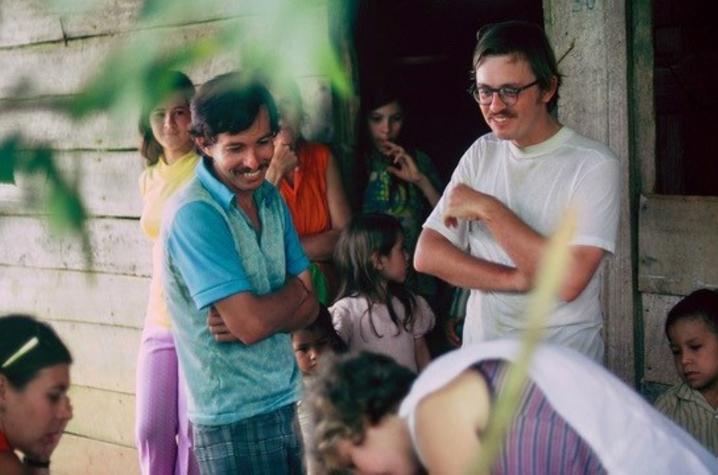UK professor recognized with lifetime achievement award for decades of community development contributions
LEXINGTON, Ky. (Dec. 23, 2024) — Growing up in rural Southern Illinois on a 300-acre farm, Ron Hustedde wasn’t expected to finish high school. The highest level of education in the Hustedde household was an 8th-grade education. The local culture of that era didn’t always see how high school or college helped someone to become “a good farmer.”
Almost 60 years later, Hustedde has earned five degrees and is an inspirational leader in community development. As a University of Kentucky Cooperative Extension professor in the Department of Community and Leadership Development (CLD) at the UK Martin-Gatton College of Agriculture, Food and Environment, Hustedde recently received a Lifetime Achievement Award from the International Association for Community Development (IACD). This award recognizes individuals who have made significant contributions to global community development.
Hustedde’s passion for supporting and transforming rural communities has been displayed in his work in Appalachian Kentucky. For example, he co-launched the Kentucky Entrepreneurial Coaches Institute to nurture 120 grass-roots leaders who stimulated hundreds of new business start-ups. They inspired changes in local policies to foster civic and business innovation. Hustedde’s leadership was also recognized when he was elected as president of the Community Development Society and one of two North American representatives on the IACD Board of Directors.
“This work feeds my soul,” Hustedde said. “What I love is seeing people transform and bringing out the best in them. That’s the heart of community development — helping people to become united, find a focus to act on their dreams and build capacity.”
Hustedde’s debut into community development
After enlisting and serving as a noncommissioned infantry officer in the U.S. Army during the Vietnam War era, Hustedde became a Peace Corps volunteer in Costa Rica where he learned to put those family farming skills to work. He learned to plow with oxen and harvest rice with a sickle for his duties as a rice researcher. During the dry season, Hustedde began working in youth development, which changed his life.
He focused on helping youth to determine their collective goals. One of their aspirations was to bring the National Symphony to their small town. The symphony is a national source of pride in Costa Rica. Youth in the community raised money to transport the musicians to the community and housed them with local families. The community was captivated by the symphony’s performance at a local church. This project provided a catalyst for youth to organize themselves and become a visible force in the community.
“Young people sometimes don’t see the wonderful mystery that they are,” Hustedde said. “I try to bring that out of them, to show them how to dream collectively.”
Here is where Hustedde remembers the spark of becoming a community developer. As his youth development work matured, a Peace Corps nurse told Hustedde that he had the potential to become a community developer. It planted a seed, and questions arose in his mind: What’s community development? How do you motivate people to take collective action? Where does one acquire skills and training to become a community developer?
Hustedde decided to return home and attend Southern Illinois University to complete a master’s degree in community development. Then he found a passion for working as an extension community development and horticulture agent in rural Wisconsin for five years.
He used his Spanish to collaborate with the Latino community and became involved with alternative approaches to economic and community development. He literally opened his home as a meeting place.
“I remember coming home and there would be 20 people meeting there into the late evening,” he said. “I learned so much from the local community to become a more effective listener, organizer and facilitator.”
His love for the community development field led Hustedde to earn two more master’s degrees and a Ph.D. in sociology from the University of Wisconsin-Madison.
Working with UK
Wanting to continue his extension career, Hustedde began as an extension professor in 1990 at UK, where he was warmly welcomed by Professor Lori Garkovich and other faculty.
Hustedde initially worked at the UK Appalachian Center, where he served as a public policy specialist and involved Appalachian leaders to more effectively deliberate about controversial issues and respect differences. He also probed deeper into public conflict resolution and trained hundreds of people with techniques to address conflict more effectively.
For almost 35 years, Hustedde has been teaching his students and community leaders the values, arts and science of community development. He expanded his community development training into Serbia, Indonesia, South Korea, Scotland, China and other settings. His publications are frequently cited by leaders in the field.
“Community development is a value-laden discipline,” said Hustedde. “We work together, and we complement each other. We ask probing questions to challenge ourselves and the communities we serve. It’s about transforming people, building shared visions, fixing problems and bringing the best out of each other.”
Furthermore, Hustedde highlighted the multidisciplinary collegiality of the CLD department at Martin-Gatton CAFE as part of its strength and impact. He is the current vice president of the UK Association of Emeriti Faculty and would like this group to become more visible on campus. He continues to provide community development workshops and guest lectures.
“I am honored to receive this international award,” Hustedde said. “It’s a recognition of our department and UK extension, which is an essential arm of our mission. It takes a village to get an award like this. It’s not just me. It’s about all of us.”
To learn more about the community and leadership development department at Martin-Gatton CAFE, visit https://cld.ca.uky.edu/.
As the state’s flagship, land-grant institution, the University of Kentucky exists to advance the Commonwealth. We do that by preparing the next generation of leaders — placing students at the heart of everything we do — and transforming the lives of Kentuckians through education, research and creative work, service and health care. We pride ourselves on being a catalyst for breakthroughs and a force for healing, a place where ingenuity unfolds. It's all made possible by our people — visionaries, disruptors and pioneers — who make up 200 academic programs, a $476.5 million research and development enterprise and a world-class medical center, all on one campus.






